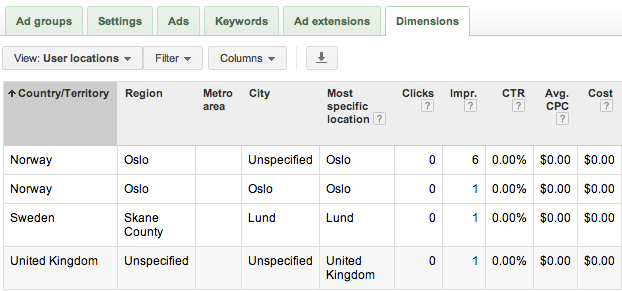I recently watched “Du är googla” (You’ve been Googled) on NRKs web-TV. It has a few interesting points, and one which I found particularly interesting is how much the Google search results on your name matter. So, knowing a thing or two about Google and AdWords from my time working for Google, I set out to answer a few interesting questions.
The first is how many people are actually googling for me. Of course, I have a bit of statistics from Google Analytics on search queries that led the user to my homepage, but this only captures those that actually clicked the entry for my homepage, and there are many more search results.
So the first hunch was to use Google trends data, but disappointingly, there’s not enough search data for me out there. Unless you’re some public figure, you’re probably going to run into the same thing. But if you’re an optimist you can give Google Trends a try.
My next approach is a bit more powerful for people with low search traffic. I set up an AdWords campaign using my name as keywords.
You can have some fun here figuring out exactly what to write about yourself. The ad itself isn’t all that important, though it should be on topic. The real reason to do this is to provide some counter-intelligence on the people who are googling for you.
What you get, assuming you have reasonably low search traffic and not much competition advertising on your name, is a very cheap AdWords campaign. If you have a webpage, your webhost likely has AdWords coupons so it may even be free for a long time. With this method, what you get is a dashboard that tells you how many times your ad was triggered (in some cases, like if you run out of budget or your ad is not relevant, it may not always show up).
So on to the more interesting question: WHO is Googling You? With AdWords you can even break down the data by geography, time of day etc. etc. which makes it more interesting. For instance, if you’re applying for a position, you may be able to see that someone in that particular location searched for you:
There are many other things you could see, like time of day and the exact search phrase used, like “Geir Engdahl IOI” or similar.
I’ll be back with more insights on this method when it’s been running for a little longer.



Impressive! And scary… at the same time.
It’s scary, but I hope it is educational at the same time. When you set up a campaign for yourself you see what advertisers can and cannot track. Then you learn which of your fears are irrational and what are actually valid concerns. No use worrying about issues that aren’t real, and knowing how the system works can let you deal with the actual issues.
Sounds like an ideal scenario for online marketers. A good profit idea, but a scary one for those who value online privacy above all.